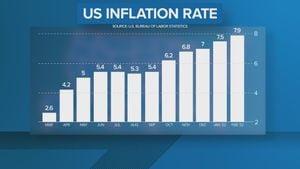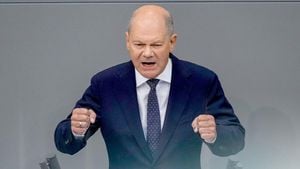The economic development strategies for low-income countries have become increasingly important as policymakers seek pathways to promote sustainable and inclusive growth. The challenges these nations face are immense due to their unique economic structures and exposure to global economic fluctuations. Understanding the right mix of strategies has become more than just academic discourse; it's a pressing need for millions across the globe.
One of the significant reports highlighting this issue came from the International Monetary Fund (IMF), which suggested there is need to raise additional revenue to fund social programs and infrastructure. A staggering $3 trillion needs to be raised globally to achieve ambitious economic growth goals. For low-income countries, this means turning to local taxation systems, most particularly property taxes.
The idea of implementing effective property taxes as a reliable revenue source has risen to the forefront of discussions within the economic community. Countries like India and those within Africa show promise; for example, Lagos increased its property tax collection fivefold to over $1 billion by broadening its tax base. This demonstrates the effectiveness and potential of property taxes when coupled with proper enforcement and efficient systems.
According to the IMF, developing nations often struggle with tax collection, enabling richer individuals and corporations to evade taxes due to the high mobility of wealth. Therefore, property taxes become especially appealing; they are rooted locally and can be collected more efficiently than income taxes, which can drive social unrest.
Property taxes can play multiple roles. They help local governments capture wealth generated through rapid urbanization. With cities growing rapidly, the wealth accumulated through property appreciation means taxes could provide significant funding for public services. Currently, advanced economies raise about 1% of GDP from property taxes, compared to roughly only 0.1% of GDP raised by similar means across most developing nations.
When property tax systems are well-designed, they create accountability within local governments. The money collected can directly fund local projects, which, if successful, promotes trust and acceptance among residents. Local governance on tax distribution often leads to more engagement from the community.
Modern technology also plays a pivotal role. Mapping properties using satellite imagery or drones can significantly increase tax coverage. By employing such technologies, cities can establish accurate fiscal registers to identify property and income, leading to effective implementation of property taxes.
While transitioning to this model, it is also imperative to address any potential adverse effects on low-income households. For example, elderly individuals, categorized as "asset-rich but cash-poor," may struggle to pay property taxes. Implementing reforms like tax deferrals until properties are sold could help mitigate any financial strain.
Global organizations like the United Nations Development Programme (UNDP) are on the front lines of trying to understand and address these economic disparities. Their reports suggest the urbanization process has spurred both opportunities and challenges, placing more people at risk of poverty, not just financially but also socially.
Data shows urban poverty is now increasing more rapidly than rural poverty. According to the UNDP, urban areas are experiencing vulnerabilities due to rising living costs and inflation, especially after the COVID-19 pandemic hit. These crises highlight urgent needs for resilient economic strategies—especially for urban dwellers who may lack the social safety nets available to those living rurally.
Fake economic prosperity during pandemics can decimate households, as employment losses or unexpected health crises push families back over the poverty line, showing the need for diverse policies to address these economic hardships. For urban and rural areas alike, the strategies about tackling poverty must be distinct and personalized.
Improving agricultural productivity is one way to address rural poverty, whereas urban poverty mitigation may require strategies to deal with increasing housing costs and access to affordable food. Supporting financial literacy and resilience-building skills can also serve important roles, equipping families to navigate future shocks to their income.
The focus on strengthening household resilience in low-income countries is becoming clear. It is insufficient merely to look at poverty reduction. Policymakers must develop comprehensive strategies aiming at economic sustainability and growth across all demographics. Investments should be funnelled not just to immediate needs but also aimed at long-term solutions such as education, health, and local enterprise development, cultivating environments where businesses can prosper and provide employment.
Intriguingly, it isn’t just tax reform or economic strategies alone. Political will and institutional capacity are necessary to create coherence among various policies and initiatives aimed at poverty alleviation and economic development. Effective communication and community engagement are pivotal to securing buy-in from the public and ensuring the successful implementation of any economic strategy.
With unique approaches like property taxation, strengthening local governance, embracing new technologies, and focusing on long-term resilience-building, low-income countries could pave their ways toward sustainable development. These measures stand not just as economically savvy choices but as ethical obligations to lift millions out of poverty, creating opportunities where hopes can bloom.
The challenges are significant and complex, but innovative solutions and inclusive policies can lead to transformative outcomes. The global narrative around economic development must evolve beyond apprehensions of structural deficiencies and focus on tangible strategies to uplift the communities most affected by poverty.
Future policies must continue to adapt and be flexible to meet incoming challenges, and through the thoughtful integration of varied strategies, low-income countries have ample opportunity to leverage their unique social, economic, and environmental contexts to drive inclusive growth. Policymakers must realize the importance of creating enduring systems of support, particularly as the world learns from the disruptions caused by global economic shocks.
Advancing economically might seem like climbing Mount Everest, but every step taken with foresight, responsibility, and community focus can make the peak not just reachable but the climb itself worthwhile.



